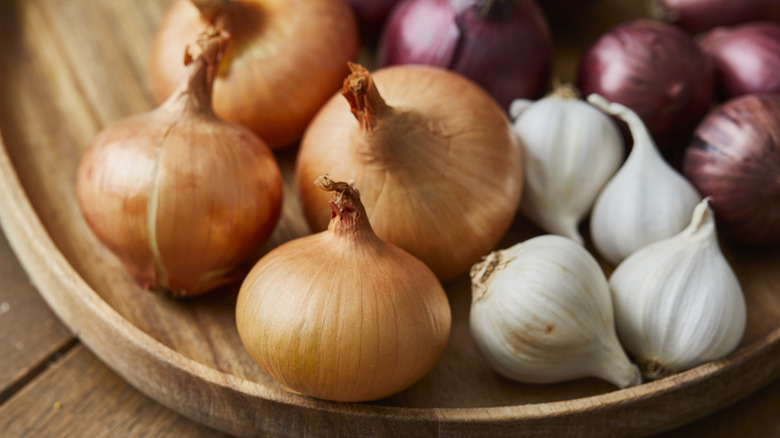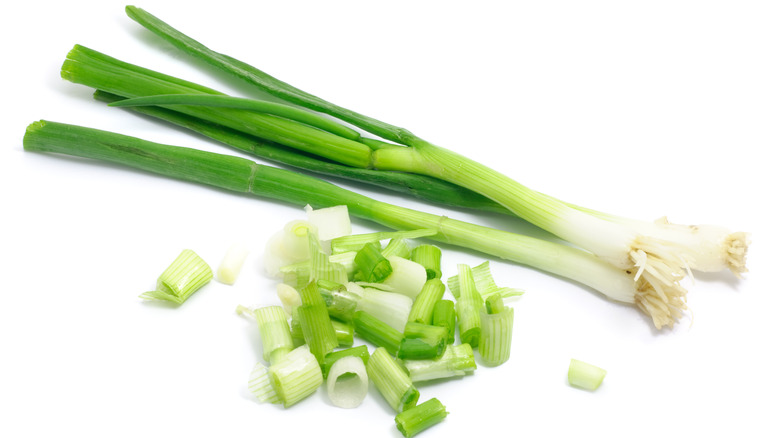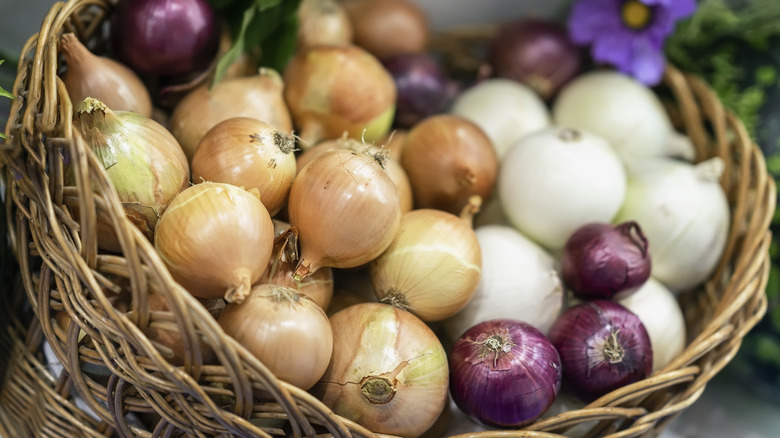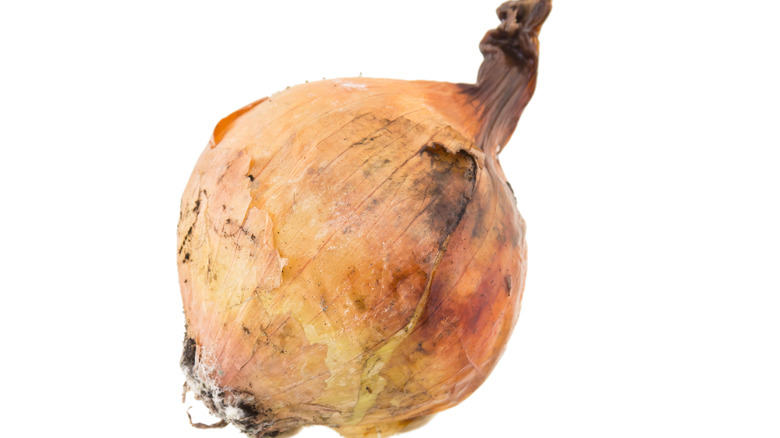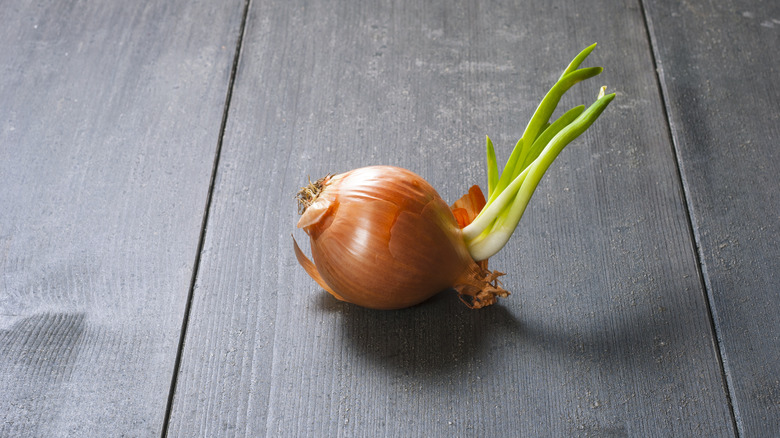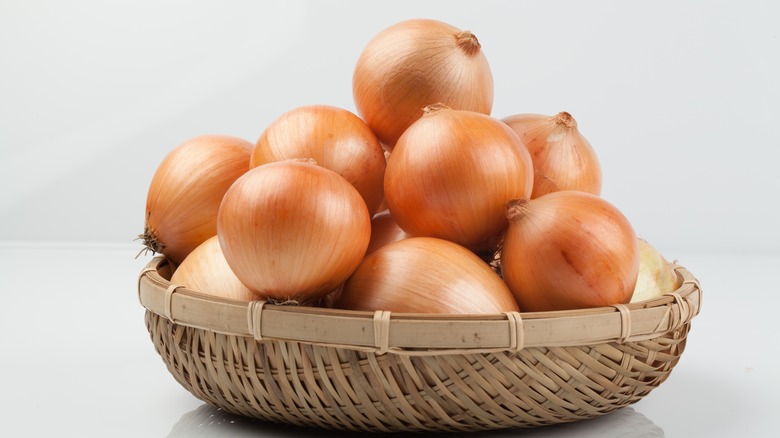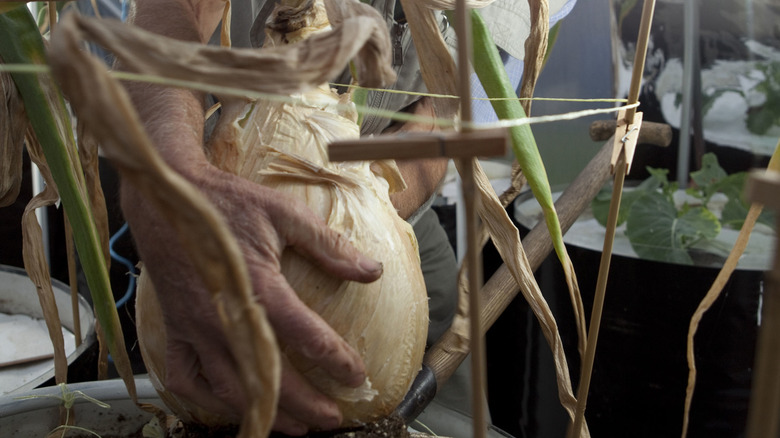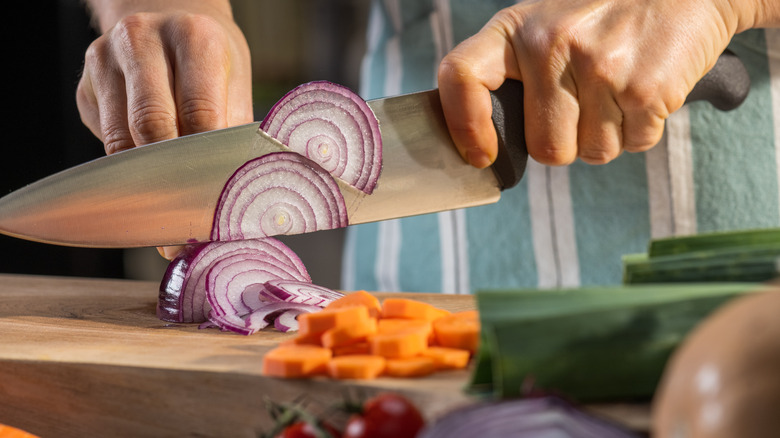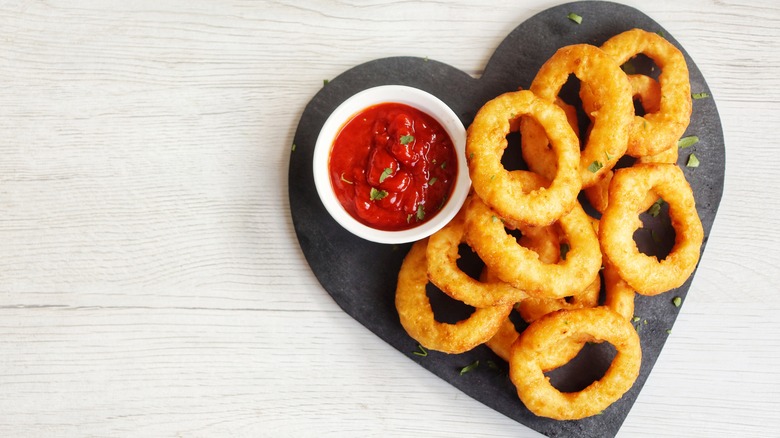False Facts About Onions You Thought Were True
Onions are a veritable kitchen workhorse, but while they're omnipresent in everything from soups to steps to pasta sauces, they are often relegated to a supporting role, forever a bridesmaid that's never quite the bride. But there's more to this multi-layered culinary staple than you might think at first glance.
Onions are presumed to be one of the world's oldest foods, though no one knows for sure how long they've been around. They're assumed to have originated in Iran and West Pakistan, and many food historians believe they were likely a staple in the diets of our prehistoric ancestors. But they weren't just a dietary staple. In Ancient Egypt, they were held in such high esteem they were buried with pharaohs, and in Ancient Rome, they were believed to heal a myriad of health woes, including poor vision, insomnia, mouth sores, dog bites, and dysentery.
The onion's popularity has not waned in modern times. New York's Lower East Side was once termed "The Big Onion" — admittedly at first pejoratively. But these days, the term has been reclaimed as a reference to the multicultural neighborhood. Both Georgia and Texas boast an onion as their official state vegetable (Vidalia and sweet, respectively), and in February 2023 in the Philippines, onions were even temporarily used as currency as part of a food bank drive.
These facts are true. Unfortunately, there's a whole host of myths about this vegetable you may have erroneously believed. Here are the false facts about onions to stop believing.
False: The best way to not cry while cutting an onion is to hold a matchstick in your mouth
Anyone who's attempted to retain some composure while chopping an onion knows the difficulty of such a task. After all, usually within moments of beginning to slice and dice, your eyes start to stream. This reaction stems from onions' richness in sulfur, which, when the cell walls are destroyed, as with slicing, breaks down into unstable sulfenic acids. These acids are then transformed into volatile syn-propanethial-S-oxide, and when these vapors come into contact with your eyes, they form tears in an attempt to rinse the irritant away.
Onions have been making humans cry for hundreds of years, so it's no surprise there's a host of old wives' tales claiming to offer a solution. These range from eating bread while you chop to breathing through your mouth to even chopping with a struck and extinguished match between your lips. But these methods are far from successful. You'd be better off freezing or refrigerating onions before chopping, which slows down the release of the chemicals. You could also opt to use a very sharp knife, which will cause less damage to the cell walls and thus allow for the release of fewer chemicals. Or better yet, simply protect your eyes with goggles while you chop. It may look funny, but it works!
False: Nothing can be done to remedy onion breath
If you've been avoiding onions and garlic on a first date, there's no need. (And there's no need to carry a travel toothbrush with you either.) Turns out that this distinctive aroma, which, much like onions' propensity for making you cry, stems from their richness in sulfur, can actually be diminished with a few simple home remedies.
Counteracting the smell of onions on your breath may be as simple as chasing it with raw produce: Apples and lettuce have both been proven to significantly counteract the odor. So, too, can the leaves of fresh herbs. Though parsley has long been the go-to, it turns out that its positive effects are difficult to prove. Fresh mint, however, can unsurprisingly have breath-freshening effects. Green tea, too, can diminish the aroma considerably, with one study showing that it worked even better than mints or chewing gum, so the next time you have French onion soup on a date, be sure to get a green tea with dessert.
False: Spring onions and scallions are the same thing
Onions appear in multiple shapes, sizes, and colors, but one big dividing factor in the category is the presence — or absence — of a tail. Scallions, green onions, and spring onions are all terms that refer to a fresh onion with a prominent green sprout. Despite their similarities, these products are actually quite different from one another, the major difference being the presence or absence of a bulb.
Scallions, also frequently marketed as green onions, are bulbless with a straight white base that extends continuously from the green top. Relatively mild as compared to many other members of the onion family, scallions can be enjoyed either raw or cooked.
Spring onions, meanwhile, as their name suggests, are young onions harvested in spring before they have reached full maturity. These onions will have a bulb, albeit one without the papery skin you'll find on other onions, and they tend to have a similar sweetness to that of a sweet onion.
False: All onions taste the same, no matter their color
The differences between green onions are not the only discrepancy to bear in mind when it comes to onion varieties. Onions offer a veritable bounty in hues from yellow to brown, white to purple. And these differences aren't just down to color: Each onion also boasts its own flavor profile.
Yellow or brown onions are the standard cooking onion, with a relatively low price point and a balanced flavor. They're best when cooked, which can help bring out their natural sugars and diminish some of their pungency. White onions tend to be a bit more potent in flavor. That said, their texture tends to break apart when cooked, so they're often used raw; they can be soaked before use to diminish some of their assertiveness. Red onions are fairly sweet and mild, and given their beautiful color, it's perhaps no surprise that they're also often enjoyed raw, as in Greek salad.
Sweet onions are, as their name suggests, quite a bit sweeter and are also ideal for enjoying raw. (Confusingly, many sweet onion varieties, like Maui or Vidalia, are also white, but they have a higher sugar content than most, and they don't have the pungency of their cousins.)
False: Onions are particularly prone to bacterial contamination
Quite a few culinary legends seem to indicate that onions have a unique relationship with bacteria or illness. Many of these stories contend that onions can attract illness, drawing germs out of the body and making them the perfect cure for the flu. It's not too much of a stretch, then, to see how people came up with the idea that onions are a "magnet for bacteria," a hypothesis that has led some to claim that sliced onions should never be stored in the fridge, lest they molder and infest the rest of your food.
Let's chalk this one up to myth: There's no evidence showing that raw onions are particularly bacteria-prone. On the contrary, onions boast powerful antibacterial compounds. If anything, they're likely safer than many other foods to store in the fridge, even if the presence of a cut onion in the icebox is likely to stink it up.
False: Sprouted onions have gone off and should be thrown away
If your onions have been hanging around the kitchen for a while, you may soon see a little sprout emerging from the top end. But while this might make you think the onion is past its prime, think again: That onion is alive and well and is merely trying to grow. It's totally edible — sprouts included!
Of course, you can't put off eating it forever. A sprouted onion will begin to grow soft, which will not be as appetizing in raw preparations. Sprouted onions also tend to taste a bit more bitter than a fresher onion, and their texture may be a bit leathery. Using sprouted onions in recipes where their texture is masked by a long cooking time, like a creamy butternut squash soup, is a great way to reduce food waste.
True signs that an onion is no longer fit for consumption include an overly soft, squishy texture, evident moisture, or small wet or brown spots. And, of course, if you see any mold, that's a surefire sign your onion has seen way better days.
False: Older onions lose their pungency
If you thought an onion needed to be used quickly to have its fullest flavor, think again: Onions actually get stronger the older they are. This is due to the presence of sulfur in the onions, which becomes stronger and more present over time. If you keep onions in a root cellar, don't be surprised if the same batch becomes more and more potent with each passing month.
The power of onions can be tempered with sweetness, and since sugars are present in onions, it's not hard to bring out this natural flavor. Caramelizing onions low and slow will diminish their bitterness and bring out their sweetness, and adding a pinch of sugar can speed up this process and make the onions themselves even sweeter. Past-their-prime onions will be delicious in an onion jam or chutney, where their flavor will be shown off at its fullest.
False: Americans don't eat that many onions
It's a long-held stereotype that the French consume more than their fair share of onions, but it turns out Americans are giving them a run for their money: As compared to about 23 pounds of onions per person in France, Americans aren't that far behind, eating an average of 19.2 pounds per person. And what's more, that average is on the rise: Americans only consumed an average of 12.2 pounds of onions back in 1982. (It must be said that neither can rival Libya, with over 60 pounds of onions consumed per person per year on average.)
In America, onions represent the third largest fresh vegetable category, with somewhere between 15 and 18 percent of onions being used in prepared food items. (This is, after all, the place where onion rings were invented!) Yellow onions are the most popular nationwide, making up a whopping 87 percent of the American onion crop.
False: Onions are good for dogs
Any dog owner knows that the second you start cooking something that smells even remotely edible, Fido comes a-sniffing. But resist the urge to give him a taste of your caramelized onions: Onions are actually toxic to dogs due to their richness in N-propyl disulfide. While this compound is harmless for humans, in dogs, it can cause a breakdown of red blood cells, which eventually causes anemia.
Just 100 grams of onion is enough to be toxic for a dog, depending on his or her size, so resist the urge to give them even a taste. Remember that this canine toxicity holds just as true for other members of the allium family, including shallots, leeks, chives, and garlic, not to mention powdered versions of onion, which may be found in seasoning blends like Cajun seasoning or blackening spices. Be sure to read the ingredient lists of your favorite seasoning blends carefully, and when in doubt, don't share ... no matter how wistfully your pup is eyeing you up.
False: Onions are relatively small
While the average medium onion you find in the grocery store weighs somewhere between about four and 21 ounces, depending on its size and variety, it turns out that onions can actually get way, way bigger than that. Gareth Griffin is one vegetable grower in Guernsey who has been growing onions for over a decade in an attempt to break the world record. In 2023, he finally cracked it with a 19.7-pound behemoth measuring 21 inches in height. This onion beat the previous world record of 18.68 pounds.
The resulting onion, the gardener explained, would likely have a mild flavor and would be perfect for harvesting seeds, but it was also perfectly edible. If an American dug in, they'd be just over their average annual onion consumption. It definitely makes you think twice about recipes calling for "one onion." Perhaps they should be a touch more specific?
False: Onions aren't that good for you
Onions often take a backseat to other ingredients in home cooking, providing an aromatic base in recipes like soups, stews, and sauces. When onions do finally get their time to shine, more often than not, it's in deep-fried form: your blooming onions, your onion rings. For this reason, it can be tempting to think of onions as junk food — but it turns out that the humble allium is actually a phenomenal superfood.
Onions are rich in healthful antioxidant, antibacterial, and anti-cancer compounds. Their richness in quercetin specifically has been shown to help promote better bone health, inhibiting the development of osteoclasts, which can cause bones to break down. This compound is so powerful that one recent Chinese study showed that eating onions could even help reverse bone loss, helping postmenopausal women regain bone mass.
Onions have also been shown to support heart and gut health, regulate blood sugar, and help with weight management. And anyone concerned with hair loss would do well to eat more onions: Turns out the sulfur in onions can help support collagen and keratin production and boost circulation, all of which contribute to stronger, healthier hair. And a long-held folk remedy that onions can cure warts is even supported by some medical experts.
False: Eating onions is bad for your sex life
Onion breath might not seem like the most potent aphrodisiac, but we find evidence everywhere, from Ancient Greece to traditional Ayurvedic remedies that show the contrary. In Ancient Egypt, priests were forbidden from eating onions in case they had titillating effects, while in Pompeii, evidence of onions has been found in brothels. In Ancient Rome, meanwhile, folks believed that onions could increase sperm quality and vitality — and it turns out they weren't completely wrong: It turns out that onions themselves can contribute to a better sex life, especially for men.
The powerful antioxidants in onions have been linked to enhanced testosterone production in men, which may, in turn, increase sexual stamina. There is also some evidence indicating that consuming onions may help with erectile dysfunction, thanks to the vegetable's anti-inflammatory properties and richness in some B vitamins, and some evidence even points to onion consumption helping to reduce the risk of enlarged prostate or prostate cancer.
And that's not all. The allicin in onions has been shown to improve blood circulation — a major plus for sexual arousal — and their richness in certain phytochemicals has been shown to regulate hormone levels, which can contribute to heightened sexual desire. It's perhaps no surprise that raw onions have long been attributed with aphrodisiac properties!
